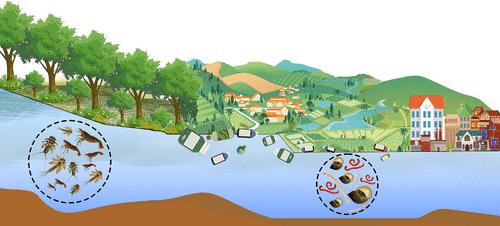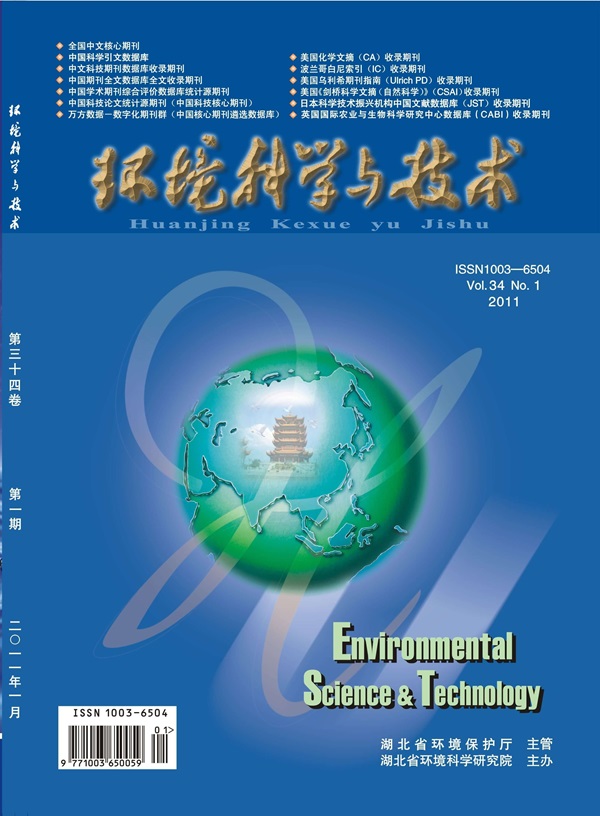农药污染降低了城市水生生态系统大型无脊椎动物的功能多样性
IF 11.3
1区 环境科学与生态学
Q1 ENGINEERING, ENVIRONMENTAL
引用次数: 0
摘要
城市化加速了创新和经济增长,但也带来了重大的生态挑战,特别是对水生生物多样性和生态系统功能的挑战。在城市压力源中,农药造成的化学污染是一种严重但尚未得到充分认识的全球威胁。量化农药对生物多样性丧失和生态系统退化的原因和后果对生态风险评估和管理至关重要,为促进社会可持续发展提供见解。本研究利用化学分析和环境DNA (eDNA)对北京市2个主要流域42个地点的大型无脊椎动物群落和人为压力源进行了评估,重点研究了多种人为压力源下大型无脊椎动物对农药暴露的反应。农药对大型无脊椎动物α-和β-功能多样性的影响显著,分别占总变异量的18.46%和14.6%,说明功能基团在农药风险评价中的作用。土地利用和流量直接影响农药水平,进而影响大型无脊椎动物的功能多样性,而基本水质的影响不太明显。这些结果为高度城市化地区农田条件下农药污染对流域尺度大型无脊椎动物功能多样性的影响提供了经验证据。研究结果强调了在城市水生生态系统农药风险评估和管理中考虑多种胁迫源和敏感分类群的重要性。本文章由计算机程序翻译,如有差异,请以英文原文为准。

Pesticide Pollution Reduces the Functional Diversity of Macroinvertebrates in Urban Aquatic Ecosystems
Urbanization accelerates innovation and economic growth but imposes significant ecological challenges, particularly to aquatic biodiversity and ecosystem functionality. Among urban stressors, pesticide-driven chemical pollution represents a critical, yet under-recognized, global threat. Quantifying the causes and consequences of pesticides on biodiversity loss and ecosystem degradation is vital for ecological risk assessment and management, offering insights to promote sustainable societal development. This study evaluated anthropogenic stressors and macroinvertebrate communities at 42 sites across two major drainages in Beijing using chemical analysis and environmental DNA (eDNA), focusing on macroinvertebrate responses to pesticide exposure in the context of multiple anthropogenic stressors. Pesticides significantly impacted the α- and β-functional diversity of macroinvertebrates, accounting for 18.46 and 14.6% of the total observed variation, respectively, underscoring the role of functional groups in pesticide risk assessment. Land use and flow quantity directly influenced pesticide levels, which in turn affected macroinvertebrate functional diversity, while basic water quality had a less pronounced effect. These results provide empirical evidence of pesticide pollution’s impact on macroinvertebrate functional diversity at the watershed scale under field conditions in a highly urbanized area. The findings highlight the importance of considering multiple stressors and sensitive taxa in pesticide risk assessment and management for urban aquatic ecosystems.
求助全文
通过发布文献求助,成功后即可免费获取论文全文。
去求助
来源期刊

环境科学与技术
环境科学-工程:环境
CiteScore
17.50
自引率
9.60%
发文量
12359
审稿时长
2.8 months
期刊介绍:
Environmental Science & Technology (ES&T) is a co-sponsored academic and technical magazine by the Hubei Provincial Environmental Protection Bureau and the Hubei Provincial Academy of Environmental Sciences.
Environmental Science & Technology (ES&T) holds the status of Chinese core journals, scientific papers source journals of China, Chinese Science Citation Database source journals, and Chinese Academic Journal Comprehensive Evaluation Database source journals. This publication focuses on the academic field of environmental protection, featuring articles related to environmental protection and technical advancements.
 求助内容:
求助内容: 应助结果提醒方式:
应助结果提醒方式:


